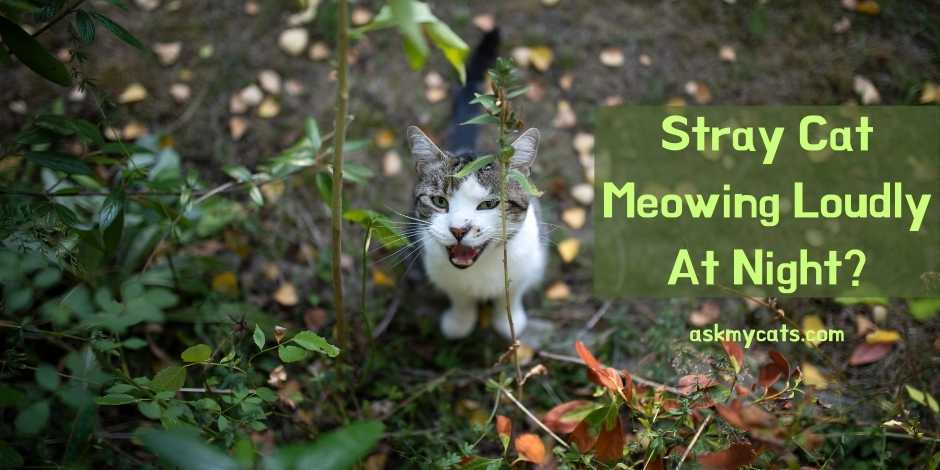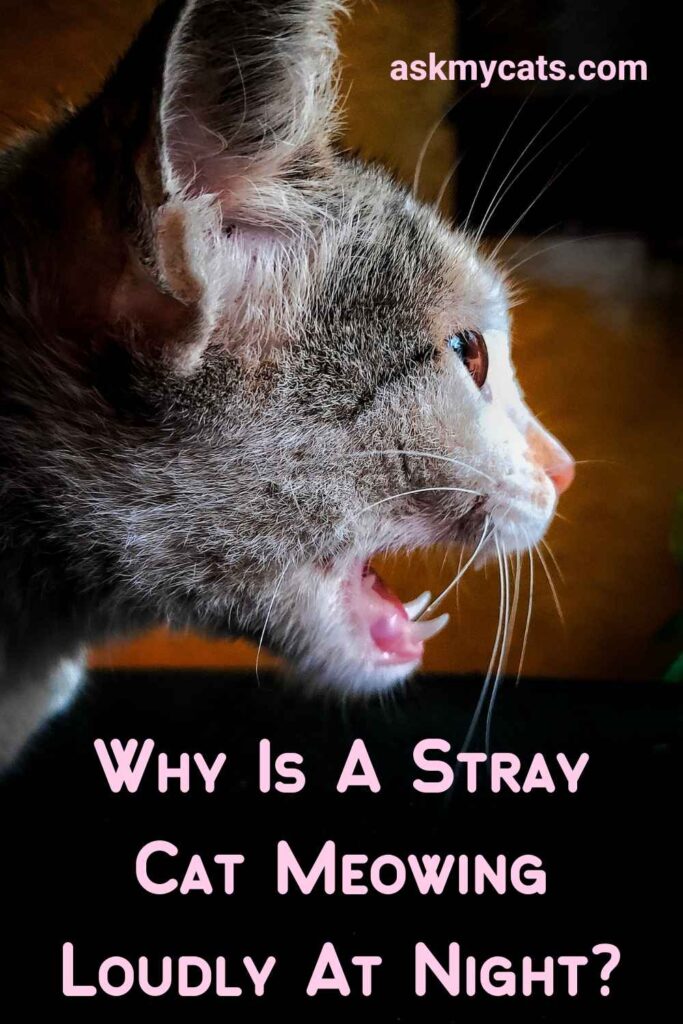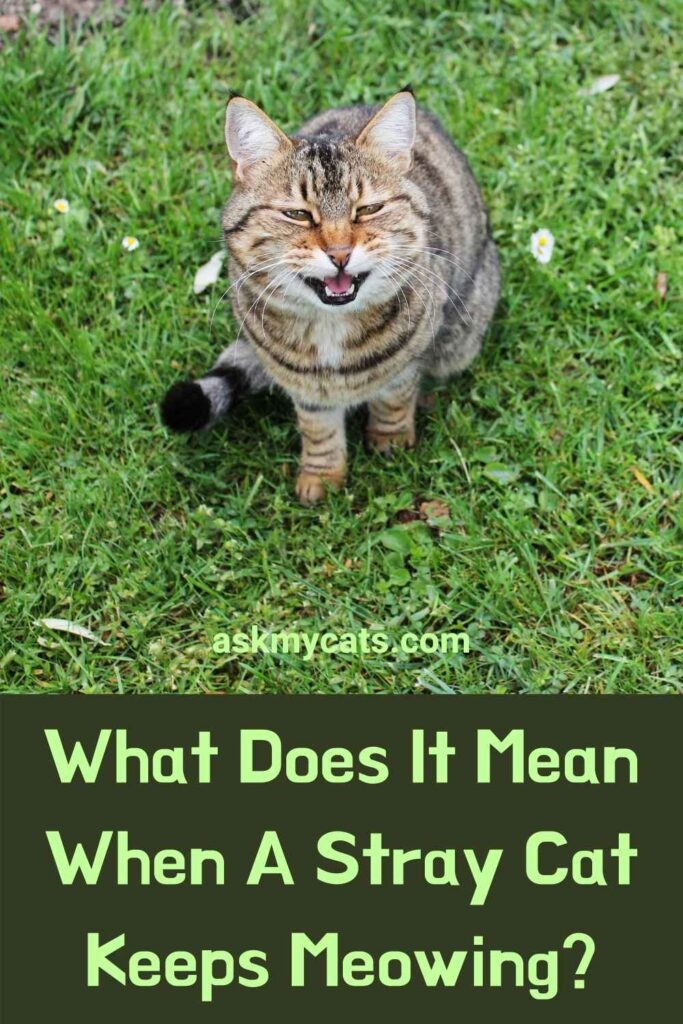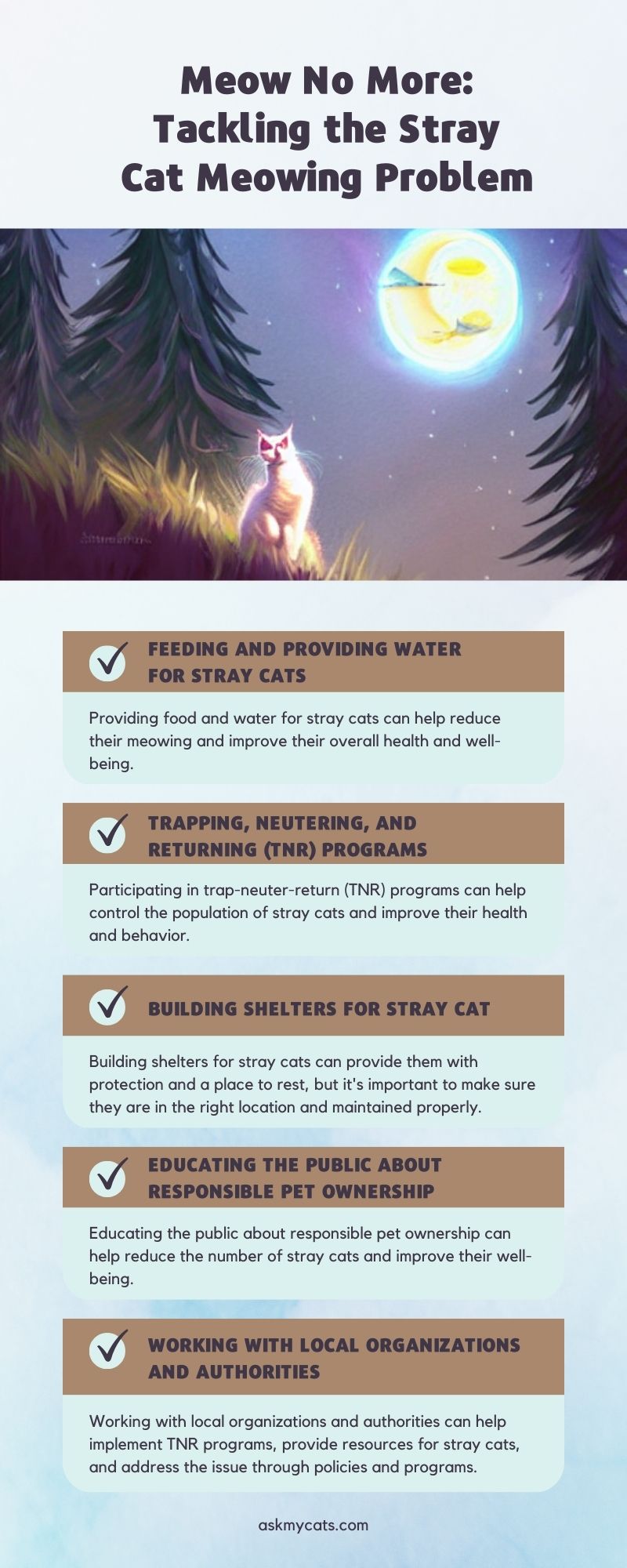Hey there, have you ever been kept awake at night by the loud meowing or crying of a stray cat outside your window?
Trust me, I know the feeling all too well. It can be frustrating and even a little annoying, but have you ever stopped to think about why that stray cat is meowing so loudly?
Well, I have and I’ve done some research on the subject, and let me tell you, the reasons may surprise you.
From hunger and loneliness to injury and illness, there are a variety of reasons why stray cats may meow or cry loudly at night. But the most interesting thing is, these cats are trying to communicate something to us.
So, if you’re tired of being kept awake at night, keep reading to find out why stray cats meow so loudly at night and what you can do to help them.
Key Takeaways
- Stray cats may meow or cry loudly at night for a variety of reasons, including hunger and thirst, weather and being cold, having kittens and not being able to reach them, pain, mating, and frustration.
- To help the stray cat, a person can try to provide food and water, offer shelter, and take the cat to a vet if it seems to be in pain.


Give Your Cat the Perfect Day
Get the Free Ebook!
Why Is A Stray Cat Meowing/Crying Loudly At Night?
A stray cat screaming in front of your door might be communicating with you because she is starving and needs to enter your house.

1. Hunger & Thirst
A stray cat’s life is difficult and unpredictable. Hunger is one of the harsh truths that feral cats must deal with on a regular basis.
Food is insufficient for these hardy little animals, which also live by digging in restaurant dumpsters or killing mice and insects.
A stray cat moaning in front of your door might be communicating with you because she is starving and needs to enter your house.
In essence, weeping may be a call for assistance — “Please feed me! My stomach is rumbling!”
As Dr. Sarah Brown, a veterinarian at the ASPCA, points out, “Cats are survivors by nature and will do whatever it takes to find food and water to survive.”
2. Weather
While lounging in the soft can sun may seem fine and dandy in the spring, stray cats must find a way to survive the bitter cold and other climate issues in November and December, particularly in frostier regions.
And if the cat develops a dense winter coat, surviving the frigid nights can be difficult (and often even fatal).
A stray cat may be telling you that she is cold and needs to share your love and shelter by weeping loudly in front of your house.
3. Kittens
Another big source of tension in a stray cat’s life is the cycle of conception and litters of adorable (but helpless) kittens.
The majority of stray and wild cats are not neutered or spayed, and stray female cats’ daily lives are also filled with the challenges of pregnancy and carrying litter after litter of kittens.
If you hear a stray cat crying outside, she might be calling out to a kitten she can’t reach, maybe because he was taken away or because of a tragic event like a car crash.
4. Pain
Living outside exposes feral cats to a variety of risky and chaotic circumstances, ranging from being run over by fast-moving vehicles to nonstop aggressive encounters with other creatures (especially when it comes to tomcats).
A stray cat is effectively signaling to you that she wants your support and affection right away by crying loudly.
You’re already all too familiar with the sound of a cat’s bloodcurdling scream or yowl whether you own one or are owned by one.
Felines are also brash and outspoken. Even if the vocalization seems to be meaningless to you, your cat is most likely trying to communicate.
5. Mating
If your male or female cat isn’t fixed, the commotion may be a sign that they’re looking for a partner. And if you believe everything is well and your cat has no excuse to cry, he may be on a roller coaster of raging hormones.
Cats also yowl and yell to signal to surrounding members of the opposite sex that they are about to mate from the rooftops. This vocalization occurs more frequently at night, which is inconvenient if you’re trying to get some rest.
6. Frustration
Screaming by a cat may also be a straightforward sign of anger. Perhaps he can’t find his precious catnip ball and is desperately searching the house for it.
Perhaps he took a long nap behind the refrigerator and is now unable to leave. A stressed-out cat who keeps yowling is one who needs a little support from you!
Also, check out why does my cat cry when i leave the room
7. Fear
A cat’s scream may also be interpreted as a form of panic.
Let’s pretend the fluff ball made a huge, messy mess in the kitchen by getting into the trashcan and getting jam all over his shirt.
If you start running the water in the bathtub, your mischievous one can recognize that it’s bath time and begin yowling and screaming incessantly.
No, no. Cats are normally terrified of water, so expect the cacophony to continue for the remainder of the wash.
8. Confusion
Cats’ intellect deteriorates as they age, whether it’s memory, vision, hearing, or something else. When a cat’s senses fail him, he will yowl and scream in bewilderment.
Maybe your beloved pet can’t find his way back downstairs and isn’t sure what to do with himself, so he screams as a coping mechanism.
9. Illness
Instead of being upset at your pet for barking for no apparent cause, accept the likelihood that he or she is in excruciating pain.
He may be sick or simply not doing well, whether it’s due to kidney failure, hyperthyroidism, diabetes, or even a bad stomach ache.
When your cutie is crying and yowling and you can’t make out why send him in for a veterinarian check-up.
You would love to read about cats crying at night superstition
What Does It Mean When A Stray Cat Keeps Meowing?
If a stray cat keeps meowing at you means she is trying to attract your attention. Meowing is a cat’s way of attracting your attention.

If this cat is circling you, it is most likely a runaway that has been socialized with people…
Meowing is a cat’s way of attracting your attention.
She might be looking for food, a family, or to be petted. Perhaps someone relocated and left her behind. I just adopted a kitten, and she did the same meowing.
Also, check out the reasons behind i just adopted a cat and it won’t stop meowing
She’s looking at you to see if you’re someone she would like to bring to her life.
The most important factor is food. Is she all right?
Cats are not ferocious… Domesticated cats are the equivalent of house cats. They’re not so good on their own… When they have a dependable adult in their life, cats excel.
She expects you to respond to her in every language you can think of! Strays and wild cats can be fixed and vaccinated for free if you call the local pet society.
Companionship is a wonderful thing. Cats are able to detect something that people are unable to.
When you hear a cat howling repeatedly, your first reaction may be that it’s a mating call to the opposite sex.
However, this isn’t always the case. Even after neutering or spaying, cats may exhibit overly vocal activity, much to the dismay of your hearing.
To attract attention, often fixed cats use howling and other vocalization strategies. After all, it frequently succeeds. If your cat is howling away in the afternoon, he may be voicing his appetite to you.
Maybe he’s about to finish his wet food can or perhaps he just wants to run around and play outside.
Maybe your fluffy friend really needs to be by you and petted — aww.
Stress is another common source of a cat howling. Cats have a keen sense of balance and can detect agitation and transition.
If you’ve just started packing boxes for a cross-country relocation or just brought home a wailing newborn infant, your cat can sense that things are different and is nervous and unsettled about it.
Excessive vocalisation is a tell-tale indication that a cat is stressed and on edge, so keeps an eye out for it.
A persistently howling, yowling, and meowing kitty may also be due to health problems. Take note that kidney failure and thyroid problems will also cause your cat to be very vocal.
Accept the possibility that your cat is in a lot of pain and discomfort if he is behaving in an unusually noisy way.
To be sure, send your cat to the veterinarian as soon as you notice any strange howling behavior — the earlier, the better.
If your kitten is getting on in years, his yowling could be due to cognitive issues that are common in senior cats.
Disorientation, vision, and hearing problems become more normal in cats around the age of ten. It’s possible that your cat is confused if he’s howling nonstop.
Maybe it’s pitch black in the middle of the night, and he’s having trouble finding his way back to his sleeping quarters. Maybe he’s pleading for assistance and needs you to lead him back “here.”
Also, check out what it means when a cat keeps meowing at door
The Negative Impact of Stray Cat Meowing and Crying on Communities
1. Noise disturbance
It’s not just you, nearly everyone who has had to deal with a stray cat meowing loudly at night will tell you it can be incredibly frustrating. The constant noise can make it hard to sleep and can leave you feeling grumpy and exhausted the next day.
It’s not just a problem for you either, it can affect your entire neighborhood.
According to a survey by the American Pet Products Association, over 50% of pet owners have reported being woken up by their pets at night. That number jumps to over 60% for cat owners.
Dr. Nick Dodman, a veterinarian and animal behaviorist at Cummings School of Veterinary Medicine at Tufts University, says “Cats are crepuscular, which means they’re most active at dawn and dusk. They’re also wired to hunt and be active when their prey is most active, which is typically at night.”
It’s not just a problem for the people who live near the stray cat either. If the cat is meowing loudly in a business district, it can be disruptive to people working late.
2. Negative impact on human mental and physical health
It’s not just the lack of sleep that can be a problem either. The constant noise can also be a source of stress, which can lead to a host of health problems.
According to the World Health Organization, noise pollution is considered to be a leading environmental stressor.
Dr. Michael J. Breus, a sleep specialist and author of “The Power of When,” says that “Chronic noise exposure can lead to an increase in blood pressure and stress hormones, which can lead to a number of health problems including heart disease, stroke, and mental health issues.”
Dr. Michael J. Breus
It’s not just the stray cat that’s causing the problem either.
According to a study by the UK’s National Centre for Social Research, over 30% of people reported being disturbed by their neighbor’s pets.
Find out why the neighbors cat meowing at my door
3. Negative impact on other animals
It’s not just humans that can be affected by stray cat’s meowing and crying at night, it can also be a problem for other animals in the area.
According to a study by the Royal Society for the Prevention of Cruelty to Animals, stray cats can have a negative impact on local bird populations.
Dr. John W. Griffin, director of the Avian Research and Conservation Institute, says “Stray cats are one of the leading causes of bird and small mammal mortality in urban and suburban areas. They can have a serious impact on local bird populations, particularly ground-nesting birds.”
Dr. John W. Griffin
4. Possible economic effects
It’s not just the health and well-being of people and animals that can be affected by stray cats meowing and crying at night, it can also have economic effects.
According to a study by the American Pet Products Association, over $2 billion is spent annually on cat food in the United States alone.
If stray cats are not neutered and controlled, it can lead to a population explosion, which can put a strain on local resources and lead to increased costs for animal control and welfare services.
As Dr. Jane Goodall, a primatologist and conservationist, says “The problem of stray cats is not just a problem for the animals themselves, it’s a problem for the entire ecosystem.”
Dr. Jane Goodall
5. The emotional side of it
The noise and disturbance caused by stray cats meowing and crying at night can be not only a disturbance for people but also a source of emotional distress.
It’s common to feel a sense of frustration and helplessness when dealing with stray cats, especially when they seem to be suffering or in distress.
Many people may feel guilty or responsible for the well-being of stray cats, especially if they have been feeding or caring for them.
This emotional toll can be especially difficult for those who have a deep love and concern for animals, as they may feel torn between wanting to help the stray cats, but also wanting peace and quiet in their own homes.
As Dr. Karen L. Overall, a veterinarian and animal behaviorist, says “The problem of stray cats is a complex one, and it requires a compassionate and holistic approach that considers the well-being of both the animals and the community.”
Dr. Karen L. Overall
Also, check out what does it mean when a cat follows you
Effective Solutions for Dealing with Stray Cats Meowing Loudly at Night

1. Feeding and providing water for stray cats
If you’re finding yourself dealing with a stray cat meowing loudly at night, one of the first things you can do is to make sure they have access to food and water.
Providing food and water can not only help to reduce the stray cat’s meowing, but it can also improve their overall health and well-being.
It’s important to keep in mind that feeding stray cats can have unintended consequences, like attracting more cats to the area, so it’s best to do it in a controlled manner, like leaving food out during specific times of the day.
Dr. Jane Goodall, a primatologist and conservationist, says “Providing food and water for stray cats is a compassionate and practical solution that can help to improve the well-being of both the cats and the community.”
Dr. Jane Goodall
2. Trapping, neutering, and returning (TNR) programs
Another solution that can help to control the population of stray cats is to participate in trap-neuter-return (TNR) programs.
TNR programs involve trapping stray cats, neutering or spaying them, and then returning them to their original location.
This can not only help to reduce the number of stray cats, but it can also improve the overall health and behavior of the cats.
According to the American Society for the Prevention of Cruelty to Animals (ASPCA), TNR programs have been shown to be effective in reducing the number of stray cats, and can also help to reduce the number of cats being euthanized.
As Dr. Karen L. Overall, a veterinarian and animal behaviorist, says “Trap-neuter-return is a humane and effective way to control the population of stray cats, and it can also improve the overall health and well-being of the cats.
Dr. Karen L. Overall
3. Building shelters for stray cat
Another solution that can help to improve the well-being of stray cats is to provide them with safe and secure shelters.
These shelters can provide stray cats with protection from the elements and predators, and can also provide them with a place to rest and sleep.
It’s important to note that while providing shelters for stray cats can be beneficial, it’s also important to make sure they are in the right location and are maintained properly to avoid attracting other animals or creating other issues.
Dr. John W. Griffin, director of the Avian Research and Conservation Institute, says “Providing shelters for stray cats is a compassionate and practical solution that can help to improve the well-being of the cats and reduce the negative impacts on the environment.”
Dr. John W. Griffin
OUR Recommendation
Keep your outdoor kitty warm and cozy all winter long with our recommended heated cat house! Click here to check now and give your furry friend the gift of comfort.
4. Educating the public about responsible pet ownership
Another way to address the issue of stray cats meowing loudly at night is to educate the public about responsible pet ownership.
This can include educating people about the importance of spaying and neutering their pets, as well as the importance of providing proper care and attention for their pets.
It can also include educating people about the negative impacts of abandoning or neglecting their pets.
Dr. Nick Dodman, a veterinarian and animal behaviorist at Cummings School of Veterinary Medicine at Tufts University, says
“Education is key in addressing the problem of stray cats. By educating the public about responsible pet ownership, we can help to reduce the number of stray cats and improve the well-being of both the cats and the community.”
Dr. Nick Dodman
5. Working with local organizations and authorities
Finally, one of the most effective solutions for dealing with stray cats meowing loudly at night is to work with local organizations and authorities.
This can include working with animal welfare organizations to implement TNR programs or provide resources for stray cats.
It can also include working with local government officials to address the issue of stray cats and implementing policies and programs to address it.
It’s important to remember that stray cat’s meowing loudly at night is not just an individual problem, it’s a community issue that requires a collective effort to address.
By working together with local organizations and authorities, we can create a comprehensive and effective solution that benefits everyone.
You might also like to read more details about why do cats cry like babies
Frequently Asked Questions
Is cat crying a bad sign?
Cats crying at night were generally associated with poor luck in various cultures. This occurrence is also thought to be a sign of impending bad luck once you hear it. A cat moaning in the middle of the night, according to the most strict explanation, suggests that someone is about to die.
What does it mean when a cat cries at night?
Cats can cry at night because they’re lonely – or because they haven’t had enough to eat during the day. Active play before bedtime, as well as trying to keep their minds active and satisfied throughout the day, can help them sleep better at night.
Final Words
Cats call out for food, drink, or love in the same way as babies do. When female cats are in heat, they whine.
To signal a particular response, cats may change the tone of their voices from short meows to long howls. Many cats will change their voices to imitate the sound of a baby crying.
Finally, if a stray cat meows late at night, you must totally ignore it in order to avoid encouraging the behavior.
Keeping the cat occupied at night can prevent it from being hungry or attempting to attract your attention in novel ways.
You might also like to know why is my pregnant cat meowing so much
Interesting Read: Do Feral Cats Purr?
References
- https://www.vet.cornell.edu/departments-centers-and-institutes/cornell-feline-health-center/health-information/feline-health-topics/feline-behavior-problems-destructive-behavior
- https://digitalcommons.unl.edu/cgi/viewcontent.cgi?article=1031&context=nwrcwdmts
- https://www.sa.gov/Directory/Departments/ACS/Wildlife/Cats

My friend has a 3 yr old indoor cat whose paw seem to bleed daily, a lot, non-stop, and I met her last Dec and it continues daily since then. I know little about cats but in 60 years of knowing people with cats and always having been around those cats I never heard of one ever having non-stop bleeding paws. She said it is called “puffy paws” and it is not that uncommon and that there is nothing any vet can do because the cat wont quit licking. There is literally blood on her baseboards at times but this seems so very unusual and definitely not ordinary and can be thought of as, Oh well! Vet said that is how it is. Is it a tic, a disease, is it fixable and is it curable and what is this called? Concerned about all of us here in Clairton PA and anxiously await your reply. Thamks
I am sorry to hear your situation.
But in this situation I would suggest you to consult some other vet for secondary opinion as condition looks serious.
Hope your lovely buddy will get well soon.
I live in the country with 3 cats and there is a cat meowing loudly around my house at night. A couple weeks ago it would sit around the house during the day but my cats would chase it away a lot. I’m not sure if it is seeking help or a female in heat. The meowing was pretty low and loud and first. I meowed back to it from my window(I couldn’t see it though) and then then meow turned into a higher more happy sounding meow like my tame cats do. We’ve fed the cat once before on the porch, is that why it’s crying?
The possible reasons for this kind of behavior can be :
● Many illnesses can make a cat hungry, thirsty, or in discomfort, all of which might result in overeager meowing.
● Additionally, cats are able to develop renal or an overactive thyroid, both of which can cause them to vocalize excessively.
● Contrary to popular belief, cats dislike being left alone a lot and may meow loudly to get your attention.